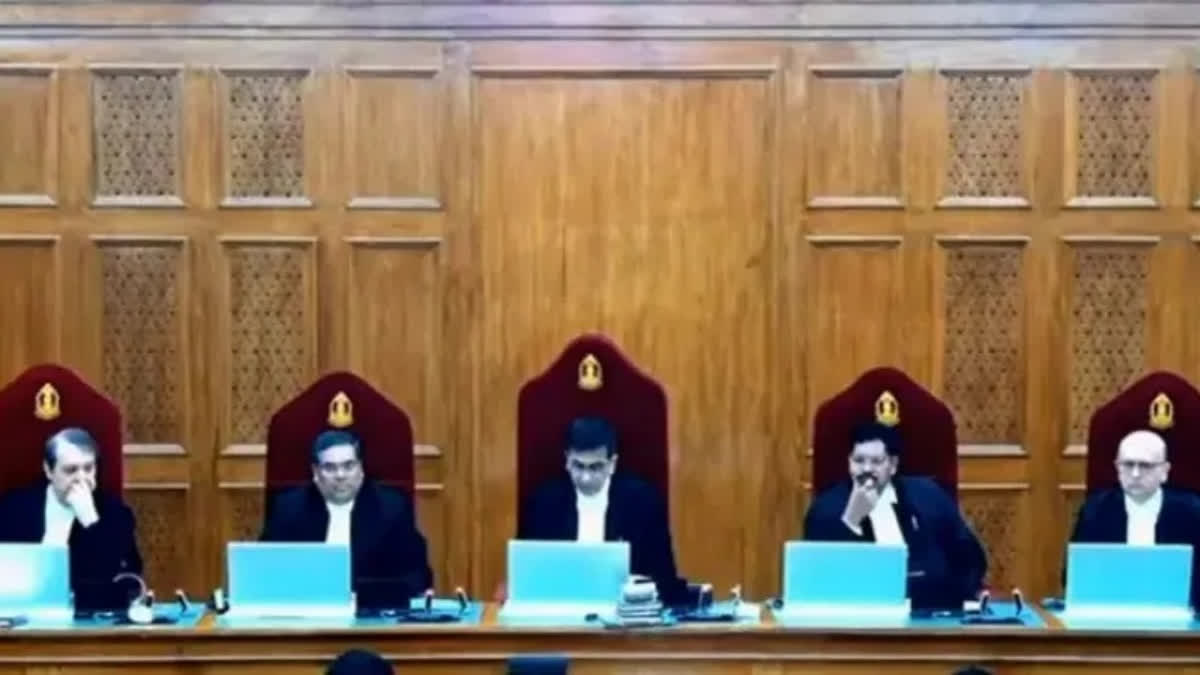New Delhi: The Supreme Court, which declared the electoral bond scheme 2018 as unconstitutional on Thursday, said the scheme falls foul and negates and overwhelmingly annuls the voter's right in an electoral process as neither the right of privacy nor the purpose of incentivising donations to political parties through banking channels justifies the infringement of the right to voters.
In his separate judgment, Justice Sanjiv Khanna refused to accept Centre’s contention that donors of a political party often apprehend retribution from other political parties or actors and thus their identities should remain anonymous. The Centre contended that the bonds uphold the right to privacy of donors by providing confidentiality and donating money to one’s preferred political party is a matter of self-expression by the donor. Therefore, revealing the identity invades the informational privacy of donors protected by the Constitution, said the Centre.
Justice Khanna stressed, “While secret ballots are integral to fostering free and fair elections, transparency—not secrecy—in funding of political parties is a prerequisite for free and fair elections”. Justice Khanna said retribution, victimisation or retaliation against any donor exercising their choice to donate to a political party is an abuse of law and power and this has to be checked and corrected. “As it is a wrong, the wrong itself cannot be a justification or a purpose. The argument, therefore, suffers on the grounds of inconsistency and coherence as it seeks to perpetuate and accept the wrong rather than deal with the malady and correct it”, he said.
Justice Khanna said the inconsistency is also apparent as the change in law, by giving a cloak of secrecy, leads to severe restriction and curtailment of the collective’s right to information and the right to know, which is a check and counters cases of retribution, victimisation and retaliation. “Transparency and not secrecy is the cure and antidote”, he said.
He said the argument that the donor may like to keep his identity anonymous is a mere ipse dixit assumption. “The plea of infringement of the right to privacy has no application at all if the donor makes the contribution, that too through a banking channel, to a political party. It is the transaction between the donor and the third person. The fact that a donation has been made to a political party has to be specified and is not left hidden and concealed”, he said.
He added that what is not revealed is the quantum of the contribution and the political party to whom the contribution is made. “Further, when a donor goes to purchase a Bond, he has to provide full particulars and fulfil the KYC norms of the bank. His identity is then asymmetrically known to the person and the officers of the bank from where the Bond is purchased. Similarly, the officers in the branch of the authorised bank where the political party has an account and encashes the Bond are known to the officers in the said bank”, said Justice Khanna.
He said the argument raised by the Union of India that details can be revealed when an order is passed by a court or when it is required for investigation pursuant to registration of a criminal case overlooks the fact that it is their stand that the identities of the contributors/donors should be concealed because of fear of retaliation, victimisation and reprisal. “That fear would still exist as the identity of the purchaser of the Bond can always be revealed upon registration of a criminal case or by an order/direction of the court. Thus, the fear of reprisal and vindictiveness does not evaporate. The so-called protection exists only on paper but in practical terms is not a good safeguard even if we accept that the purpose is legitimate”, he said.
He said under the scheme, political parties in power may have asymmetric access to information with the authorised bank and they also retain the ability to use their power and authority of investigation to compel the revelation of bond-related information. “Thus, the entire objective of the Scheme is contradictory and inconsistent. Further, it is the case of the Union of India that parties in power at the Centre and State are the recipients of the highest amounts of donations through Bonds. If that is the case, the argument of retribution, victimisation and retaliation is tempered and loses much of its force”, said Justice Khanna.
He said the rational connection test fails since the purpose of curtailing black or unaccounted-for money in the electoral process has no connection or relationship with the concealment of the identity of the donor, and payment through banking channels is easy and an existing antidote.
“The RBI had objected to the Scheme since the Bonds could change hands after they had been issued. There is no check for the same as the purchaser who has completed the KYC, whose identity is thereupon completely concealed, may not be the actual contributor/ donor. In fact, the Scheme may enable the actual contributor/donor to not leave any traceability or money trail. Money laundering can be undertaken in diverse ways”, he said.
The apex court declared that amendments to the Income Tax Act and Section 29C of the Representation of Peoples Act, are unconstitutional. It also said the State Bank of India (SBI) will “forthwith stop the issue of electoral bonds” and furnish all details of those who have encashed the bonds so far and directed the Election Commission of India to publish these details on its website by March 13.
Read More



